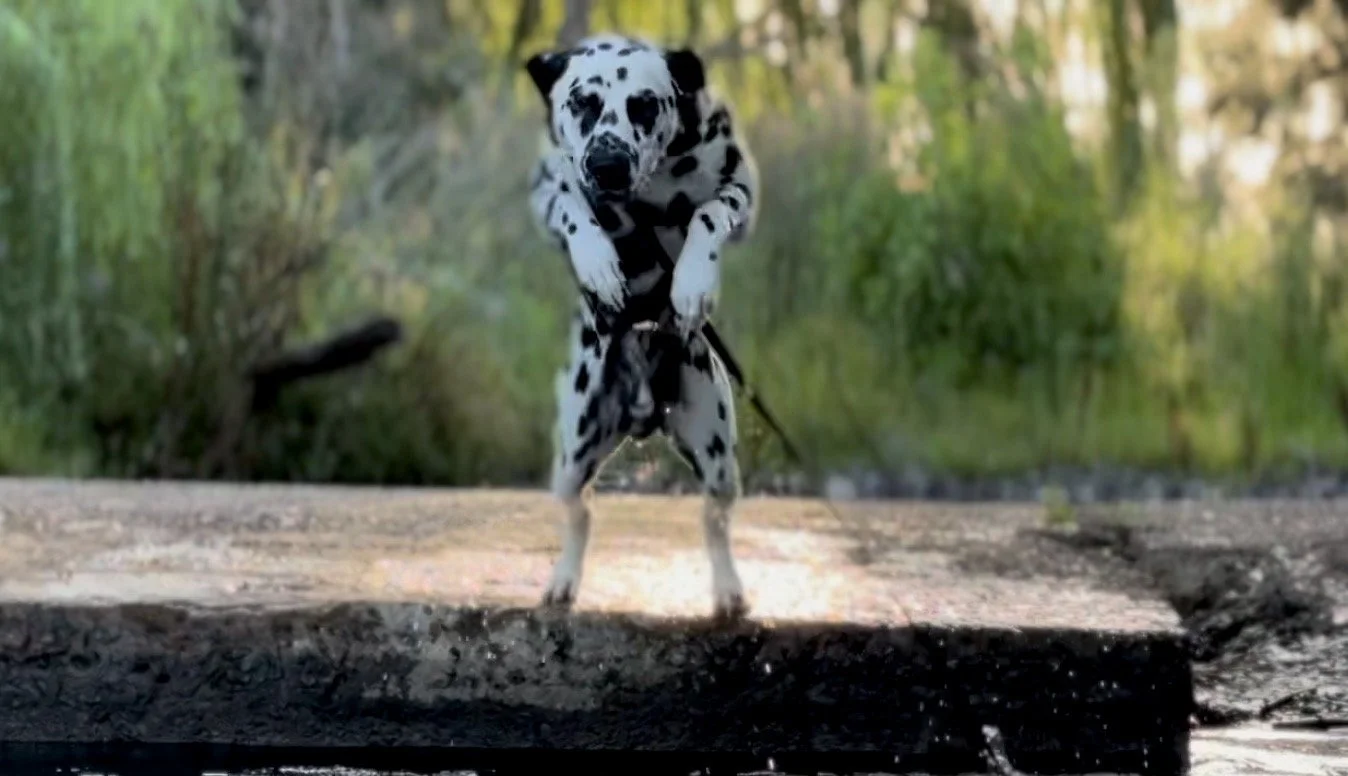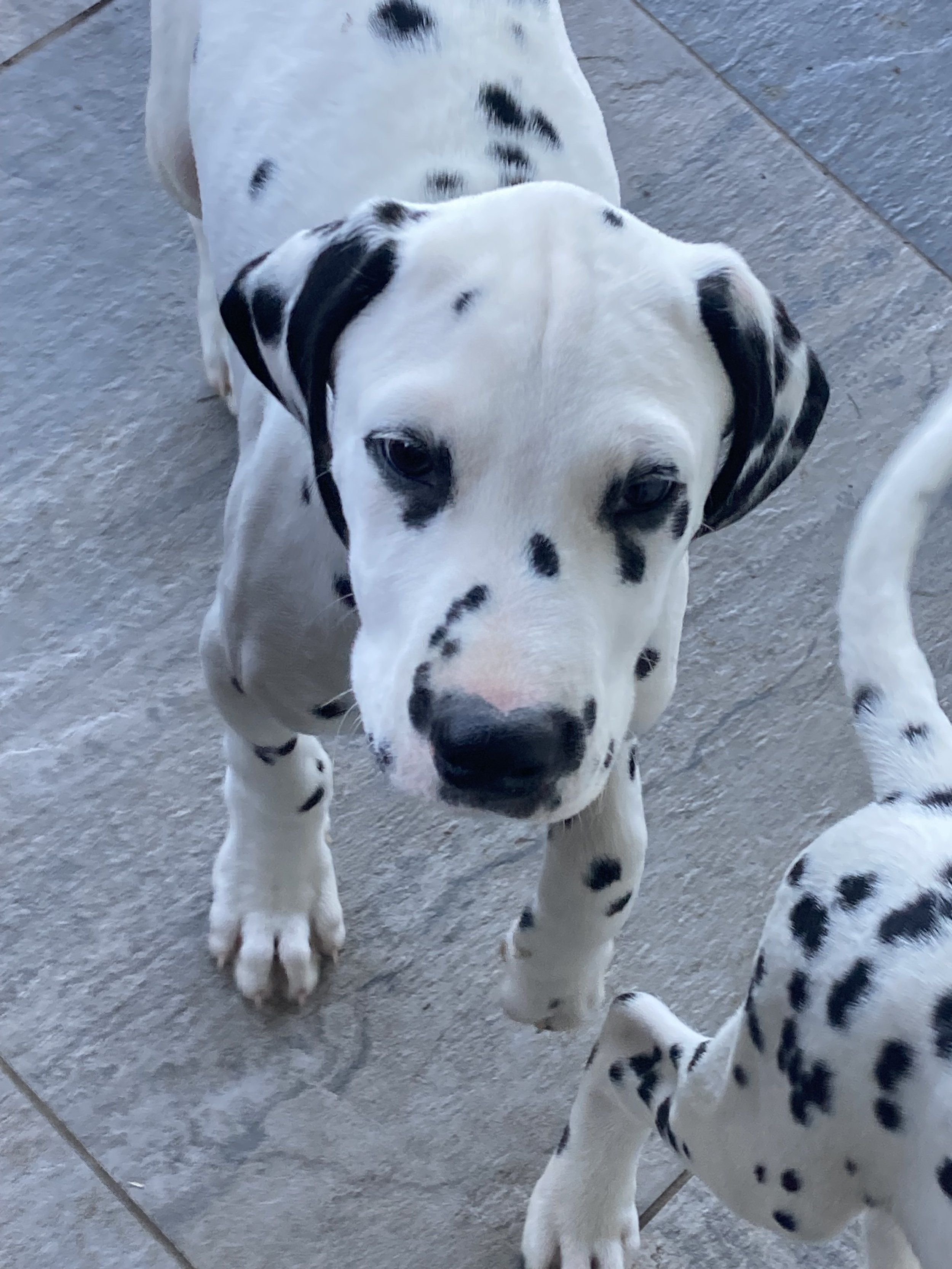
Dalmatian
The Dalmatian is a distinctive breed known for its unique black or liver-spotted coat. The breed's origins are somewhat mysterious, but it is believed to have ancient roots and is named after the Dalmatia region of Croatia. Dalmatians have been used for various roles over the years, including as carriage dogs, war dogs, and firehouse mascots. Their elegant appearance and high energy levels have made them popular as both working dogs and family pets.
Fun Fact!
Dalmatians are famous for their historical role as carriage dogs, running alongside horse-drawn carriages to protect passengers and horses from other dogs and thieves.
Overall
Dalmatians are energetic, intelligent, and social dogs that make excellent companions for active families. They require regular exercise, mental stimulation, and companionship to stay happy and healthy. They thrive in homes where they can be an integral part of family activities.
Essential information
-
Qualities
Energetic and Playful
Dalmatians are known for their high energy and playful nature, making them great companions for active families.
Striking Appearance
Their unique spotted coat makes them stand out, and they often attract admiration and attention wherever they go.
Good with Active Families
Dalmatians thrive in environments where they can participate in physical activities like running, hiking, and playing.
Loyal and Protective
They are known for their loyalty and can be protective of their families, making them good watchdogs.
-
Considerations
High Exercise Needs
Dalmatians require a lot of physical activity to stay happy and healthy. Without sufficient exercise, they can become bored and destructive.
Stubbornness
They can be independent and stubborn, which can make training challenging. Consistent, positive reinforcement techniques work best.
Shedding and Grooming
Dalmatians shed year-round and need regular grooming to manage their coat and minimize shedding.
Potential Health Issues
Dalmatians can be prone to certain health issues, including deafness and urinary stones, requiring attentive care and regular vet visits.
-
Exercise & Training
Exercise Needs
Dalmatians are very active dogs that require a lot of exercise to stay physically and mentally stimulated. They enjoy activities like running, hiking, and playing fetch. Ensuring they get enough exercise is key to preventing boredom and destructive behaviours.
Walks
At least one to two long walks or vigorous exercise sessions per day are recommended to meet their energy needs. Dalmatians love to run and can be great jogging companions.
Training
Dalmatians are intelligent but can be stubborn, so training should be consistent and based on positive reinforcement. Early obedience training is essential, especially for recall and leash manners.
-
Cost
Purchase Price
$1,000 - $2,500 AUD depending on breeder and lineage.
Initial Setup
Around $400 - $600 AUD. (crate, bed, toys, etc.)
Food
Approximately $800 - $1,200 AUD per year, depending on the dog’s size and dietary needs.
Grooming
Regular grooming can cost around $200 - $400 AUD per year, primarily for managing their shedding.
Vet Bills
Initial vaccinations, microchipping, and desexing can cost around $500 - $1,000 AUD. Ongoing annual check-ups and preventive care could be around $300 - $500 AUD per year.
Total Lifetime Cost
Over a 12–14-year lifespan, the total cost of ownership can range from $18,000 - $32,000 AUD, depending on health and lifestyle factors.
-
Characteristics
Size and Weight
Dalmatians typically stand 48-61 cm (19-24 inches) tall and weigh between 22-32 kg (48-70 lbs), with females generally being smaller than males.
Coat
They have a short, dense coat that sheds continuously, with more intense shedding during seasonal changes.
Colour Options
Dalmatians are known for their white coat with black or liver spots. The spots are distinct and vary in size and distribution.
Temperament
Dalmatians are intelligent, energetic, and friendly. They enjoy being part of family activities and have a strong desire to be included in everything their owners do.
Good with Children
Dalmatians can be good with children, especially if they are properly socialized from a young age. Their playful and protective nature makes them excellent family dogs, but supervision is recommended around very young children.
Socialisation
Early socialization is crucial for Dalmatians to help them develop into well-rounded adults. Exposure to different people, animals, and environments will help them become more confident and well-behaved.
-
Living Environment Suitability
Indoors vs. Outdoors
Dalmatians can live indoors but need plenty of outdoor activities to burn off their energy. They are best suited to homes with access to a yard where they can run and play.
Apartment Living
Dalmatians can adapt to apartment living if they get ample outdoor exercise, but their high energy and tendency to be vocal can make it challenging.
Time Alone
Dalmatians do not do well when left alone for long periods. They are social dogs that enjoy being with their families and can develop separation anxiety if left alone too long. They are best suited for homes where someone is around much of the day or with another pet for companionship.
-
Healthcare
Common Health Issues
Dalmatians are prone to certain health conditions, including deafness (which affects about 30% of the breed), urinary stones, and skin allergies. Regular veterinary check-ups and a balanced diet are important to keep them healthy. Monitoring their hydration and diet can help prevent urinary issues.
-
Additional info
Guarding Ability
Dalmatians can be protective of their families and make good watchdogs. They will alert their owners to strangers or unusual activity.
Affectionate Nature
Dalmatians are affectionate dogs that enjoy spending time with their families. They are known for their loving and loyal nature and enjoy being involved in family activities.
Suitability for Dog Parks
Dalmatians are generally friendly with other dogs and enjoy socializing at dog parks. However, due to their high energy levels, they should be supervised to ensure they play nicely with other dogs.
Climate Adaptability
Dalmatians can adapt to various climates, but their short coat means they may need extra warmth in colder weather. In hot weather, providing plenty of water and shade is essential to keep them cool during outdoor activities.
Ethical Breeding Considerations
Ensure you purchase from a reputable breeder who conducts health screenings to minimize the risk of hereditary health issues. Ethical breeding practices help ensure the well-being of the puppies and reduce the likelihood of genetic disorders.







